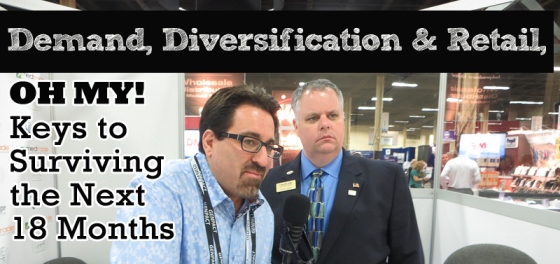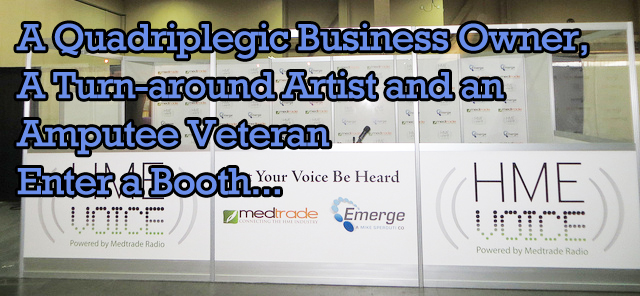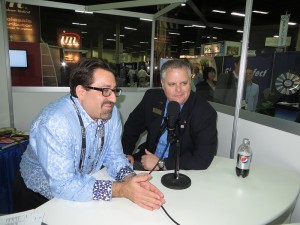You always hear about “must-see” events on TV these days. Well, folks, I’m telling you that our latest episode of HME Voice is a “must-listen!” We were joined by three guys that will be presenting at the Medtrade Conference in October as part of the “6-4-18” series of six building blocks for survival and success in the HME industry in the next 18 months.
Our first guest was Brian LaDuke, Vice President of Enterprise Marketing at Invacare. As one of the leading manufacturers of home medical equipment products, Invacare has the resources to look at the industry as a whole, and Brian said despite the gloomy feeling in the industry, it’s a good place to be.
“Clearly this industry is facing its challenges, but we really see that there’s a second side to this story, there’s a page two and there’s a lot of opportunity for success in this industry,” Brian said. “The Baby Boomers are clearly aging…so being in the home medical equipment space, from a demand standpoint, is a great space to be in. We all just have to learn how to do it more effectively in order to generate the profit that we all want.”
Brian also touched on research done by Invacare about the quality of products the most financially successful providers are purchasing. In their research, the most financially sound providers are purchasing higher quality products.
Brian said that in the race to cut costs, many providers are switching to cheaper, lower quality products. However, this doesn’t always help as lower quality equipment, while initially less expensive, incurs more maintenance costs.
Stocking quality products was also a point touched on by our second guest, Bruce Brothis of Allegiant Billing and Consulting, Inc. By having a good-better-best stock of products available in a retail setting, you appeal to the changing demographics of the people making purchasing decisions, Bruce said.
“It’s typically not the patient coming in and visiting the DME store anymore, its typically the son or daughter, nephew or niece that’s caring for that person, and typically they have disposable income,” he said. “They’re making the purchase decision right there on the spot and typically are not happy with the bare-bone minimum offerings; they like to have more upgraded products, and they’re willing to spend [the money].”
Bruce also provided a few tips about finding success by switching to a more retail-based model. Being stuck back in the corner of a business park isolated from high-traffic areas is no longer going to work. For a retail plan to succeed, Bruce recommended having at least 800 sq. ft. of space that’s in public place with a lot of drive-by or foot traffic. A successful retail DME operation also needs to have the right sales staff, said Bruce.
“Retail sales is not a place for order takers in the DME world,” Bruce said. “Retail is not grocery store retail, it’s retail with some people on the floor that can cross-sell and know what they’re talking about.”
Finally, Bruce touched on operating efficiencies, and how the biggest part of finding success is finding the right number of employees and making sure they are trained, especially those in billing or reimbursement positions.
Our final guest was Jonathan Sadock, Managing Partner and CEO of Paragon Ventures. As someone who works with valuing companies for sale and purchase, Jonathan was able to give us a unique look at the industry. He said that whether you are looking at selling your company or acquiring another business, being idle is not an option in today’s industry.
“To move forward and survive, business owners need to be active in one sense or another,” Jonathan said. “Now is not the time to be sitting idly by and watching what everybody else does and hoping you can squeeze with business as usual. In fact it’s business as unusual.”
Jonathon was able to give us some insight into what factors increase or decrease the value of a company, such as:
- Do you have contracts?
- How the business is managed: do you purchase well?
- Do you manage your employees well? Are people working at efficiency?
- Are you maintaining your equipment well?
- Your company’s relationships with other payers besides Medicare (big hospital systems, etc.)
- A strong sales team with great relationships with accounts and referral sources
As if the importance and opportunities created by a retail model wasn’t apparent already, Jonathon confirmed that in the eyes of financial experts, retail and similar models are the way to go.
“The models in which they’re making it easy for a patient to come into your store and to upsell them on products and services that you’re offering on a cash basis, is absolutely looked at, especially by the private equity firms, as part of the future of how this industry is going to evolve down the road,” he said.
People, we are in a time of change in our industry; we all know this. But not all news is bad. The demand for our products and services will continue to grow, we just need to find new ways of working to succeed. Success can be had in the coming months, but it depends on you to go out there and get it.
I’d like to thank my wonderfully insightful guests, Brian LaDuke, Bruce Brothis and Jonathan Sadock for joining myself and Kevin Gaffney on the HME Voice. You guys provided a ton of great information, advice and tips, and now it’s up to the listeners and readers to get active. Until next time, stay safe and keep a positive mindset in your work!








